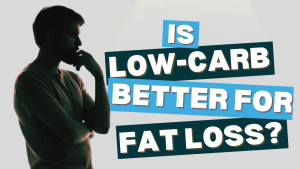Is Low-Carb Better for Fat Loss?
One of the most common questions we get from clients is:
"Do I need to go low-carb to lose weight?"
Let’s break down what really matters—and how low-carb diets might help, but aren’t always the magic bullet they seem to be.
It Starts With a Calorie Deficit
As we’ve mentioned before, the #1 rule for fat loss is a calorie deficit. That means you're eating fewer calories than your body burns.
But here’s the real secret: your ability to stick to that deficit—influenced by your macro and micronutrient choices—is what determines your success.
So, Why Do People Love Low-Carb Diets?
Low-carb diets get a lot of hype. One big reason is that people see fast results on the scale—but that initial weight loss isn’t all fat.
Carbohydrates are stored in the body along with water. For every gram of carbs stored, your body holds onto about three grams of water. So when you cut carbs, y drop water weight quickly.
That’s not fat loss—it’s fluid.
Weight Loss vs. Fat Loss
When people say they want to "lose weight," they usually mean lose fat.
Fat loss is slower and steadier—but it’s the meaningful, long-term goal.
Can You Cut Calories by Dropping Any Macro?
Yes! You can create a calorie deficit by cutting:
-
Protein
-
Carbs
-
Fats
-
Or by eliminating entire food groups (which usually removes a macronutrient).
But that doesn’t mean all options are equal in outcome.
Why We Recommend a Balanced Deficit
Rather than slashing just one macro, most clients see the best results when we cut calories evenly from both carbs and fats. Here’s why:
? Low Fat?
Too little fat = hormone issues.
You need fats to produce sex hormones, maintain mood, and feel strong.
? Low Carb?
Too little carb = performance drops.
Carbs are your body’s preferred fuel for exercise and brain function.
Tailor Your Approach to Your Goal
-
If gym performance is a priority: cut less from carbs and more from fat.
-
If general fat loss is the goal: a more balanced cut from both macros works best for most people.
Final Thought: Low-Carb Isn’t Necessary
Low-carb works for some.
But for most people, the best diet is one you can stick to—while maintaining energy, strength, and hormonal health.
Choose your macro split based on your goals, not just scale speed.

